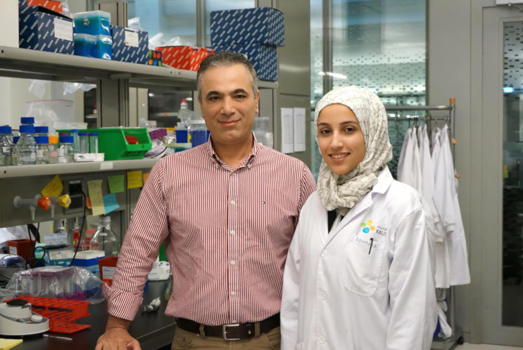Saudi Research Science Institute (SRSI) shapes future scientists and leaders of Saudi Arabia

The Saudi Research Science Institute (SRSI) is preparing for its fifth annual summer program, in which top Saudi high school students from throughout the Kingdom will conduct university-level research on the University's campus under the mentorship of KAUST faculty.
The SRSI is a research program that introduces students to the transformative potential of science, technology, engineering and math (the STEM fields), and inspires them to pursue further education and careers in these fields. It is the first STEM summer program for high school students in Saudi Arabia to combine theoretical coursework and research. SRSI is a gateway to future studies at KAUST, and is aimed at developing the next generation of scientists, researchers and leaders for Saudi Arabia.
IMMERSING STUDENTS IN RESEARCH
KAUST faculty members play a vital role as mentors for SRSI students, developing independent research projects for them and working closely with them throughout the intensive six-week program. The projects immerse students in research while giving them an opportunity to work with graduate students and post-doctoral fellows, learning first-hand about a research career.
Lamees Alshaikh, a high school senior at Dhahran Ahliyya Schools, participated in the 2014 program.
"I first heard about SRSI from friends at the Saudi National Olympiad for Scientific Creativity in 2011," she said. "I was working on an independent project, and I was struggling to find a qualified lab where I could conduct my experiments. As soon as I learned about SRSI, it became a dream of mine to attend it, and I couldn't wait until the summer of 2014 when my dream became a reality."
Lamees worked at KAUST under Associate Professor of Biosciences Salim Al Babili, studying the biosynthesis of hormones in Chlamydomonas reinhardtii, a type of algae.
"The experiment designed for my project took some time to complete, and I had to stay in the lab even after assigned work hours," Lamees explained. But this was not a problem for her, as she enjoyed every bit of it. "With my supportive research team, spending my time doing research was a pleasure – it was what I had wanted from the very beginning, and I learned things beyond what were needed for my project," she said.
Prof. Al Babili was amazed at the amount of knowledge and understanding Lamees acquired in a few weeks. "The program certainly encourages curiosity and arouses the interest of students in higher-level scientific research," he said. "It is an excellent way to recruit the best students in the Kingdom to come back to KAUST as master's degree or Ph.D. students."
AN OPPORTUNITY OF A LIFETIME
Lamees said that her time at KAUST and in SRSI were both a once-in-a-lifetime experience. "I enjoyed the program more than anything I have done before. SRSI was the definition of a well-rounded program – it was a truly extraordinary and transformational educational experience," she noted.
Farzan Ghodsi, also a graduate of the 2014 program, described how he was matched to conduct research in his favorite branch of science, electrical engineering.
"I'm currently a senior at The KAUST School, and I was contacted by KAUST's Saudi Initiatives organization to apply for SRSI. I didn't hesitate, as I had already heard from one of my friends from the 2013 program how incredible it was," he said.
Farzan worked under Professor of Electrical Engineering Boon Ooi to study semiconductor quantum dot lasers.
"The goal of the project was to fabricate and characterize novel semiconductor quantum dot lasers. These lasers have the potential to replace power-hungry electronic circuits for interconnects and clocking applications in data centers, server farms and supercomputers. My research involved developing new technology for semiconductor laser characterizations," Farzan explained.
The 2014 program was Prof. Ooi's fourth time as an SRSI mentor. "I enjoy working alongside high-energy and motivated students, and I learn a lot from them," he said. "It is extremely rewarding to see students join the research group without knowing much about the topic, and then to later see them independently present the work to a large audience."
Farzan said he enjoyed every second of the program. "SRSI allowed me to explore the field of electrical engineering, and solidified my decision to major in electrical engineering for my undergraduate degree. The program also taught me about the true dedication required to conduct research in science and engineering, and gave me many other skills that will last a lifetime," he explained.
MENTORING THE FUTURE SCIENTISTS OF TOMORROW
Kazuhiro Takanabe, KAUST Assistant Professor of Chemical Science, mentored high school student Mohammed Al Shebber during the 2014 SRSI program.
"The SRSI students have bright minds, immense enthusiasm and lots of imagination. All these qualities lead to new and innovative ideas that are the keys to exploring and solving problems in the scientific world. That really makes me excited about the program," Prof. Takanabe said.
Prof. Takanabe also noted the value of the program for Saudi Arabia. "For the students, going from high school to working in a world-class, international research university with state-of-the-art facilities might be a stepping stone to becoming a leader for the country," he said. "The research and the program nourish the students, and through this one can expect a better future for the Kingdom and the world."
SRSI is currently recruiting faculty members to serve as mentors for the 2015 program. If you are interested in mentoring an SRSI scholar, please contact srsi@kaust.edu.sa.
By KAUST News

